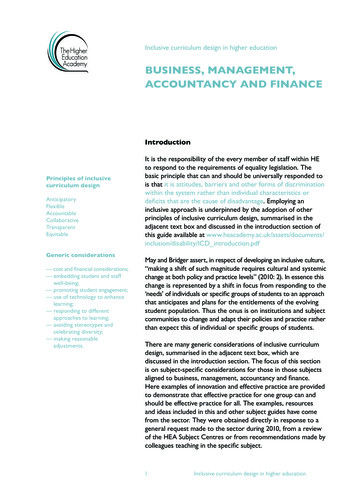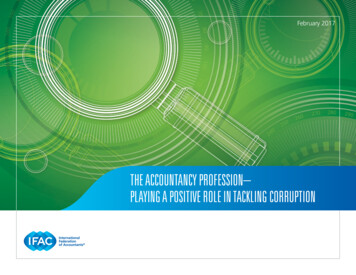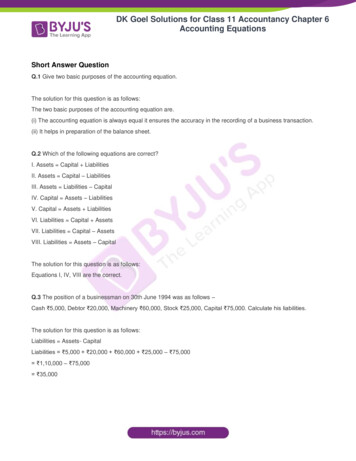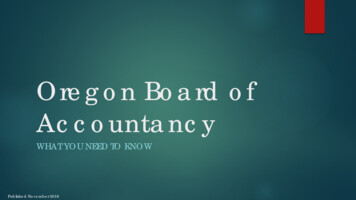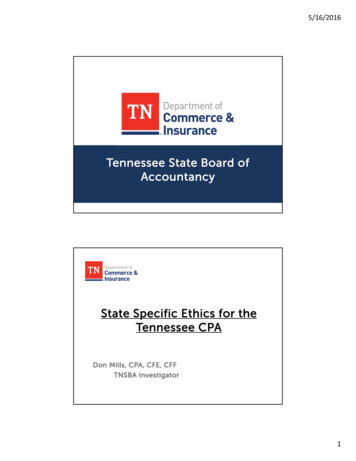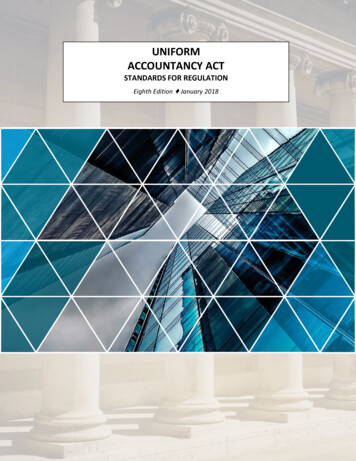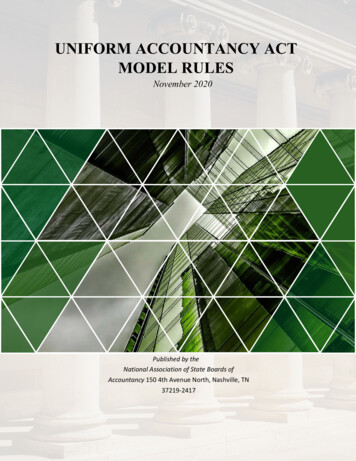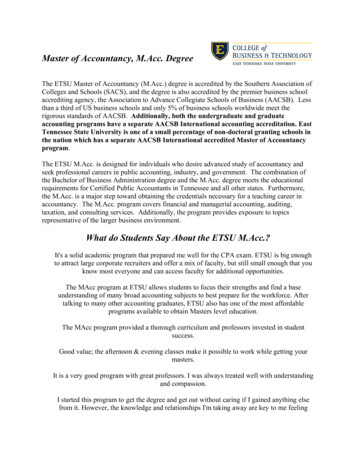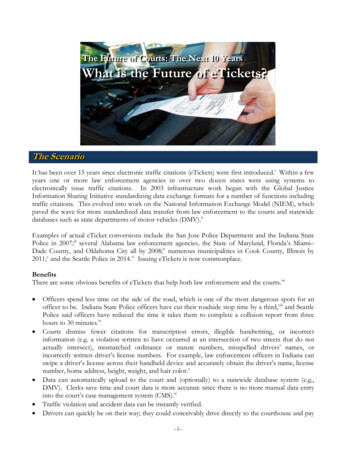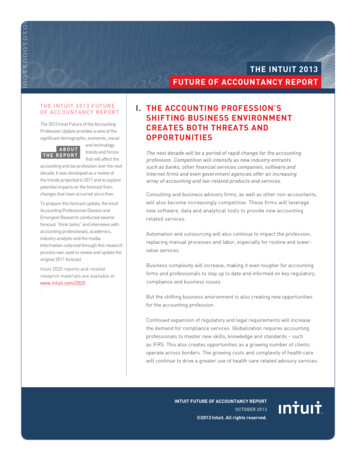
Transcription
THE INTUIT 2013FUTURE OF ACCOUNTANCY REPORTTHE INTUIT 2013 FUTUREOF ACCOUNTANCY REPORTThe 2013 Intuit Future of the AccountingProfession Update provides a view of thesignificant demographic, economic, socialand technologyABOUTtrends and forcesTHE REPORTthat will affect theaccounting and tax profession over the nextdecade. It was developed as a review ofthe trends projected in 2011 and to explorepotential impacts on the forecast fromchanges that have occurred since then.To prepare this forecast update, the IntuitAccounting Professional Division andEmergent Research conducted severalforecast “think tanks” and interviews withaccounting professionals, academics,industry analysts and the media.Information collected through this researchprocess was used to review and update theoriginal 2011 forecast.Intuit 2020 reports and relatedresearch materials are available atwww.intuit.com/2020.I. THE ACCOUNTING PROFESSION’SSHIFTING BUSINESS ENVIRONMENTCREATES BOTH THREATS ANDOPPORTUNITIESThe next decade will be a period of rapid change for the accountingprofession. Competition will intensify as new industry entrantssuch as banks, other financial services companies, software andInternet firms and even government agencies offer an increasingarray of accounting and tax-related products and services.Consulting and business advisory firms, as well as other non-accountants,will also become increasingly competitive. These firms will leveragenew software, data and analytical tools to provide new accountingrelated services.Automation and outsourcing will also continue to impact the profession,replacing manual processes and labor, especially for routine and lowervalue services.Business complexity will increase, making it even tougher for accountingfirms and professionals to stay up to date and informed on key regulatory,compliance and business issues.But the shifting business environment is also creating new opportunitiesfor the accounting profession.Continued expansion of regulatory and legal requirements will increasethe demand for compliance services. Globalization requires accountingprofessionals to master new skills, knowledge and standards – suchas IFRS. This also creates opportunities as a growing number of clientsoperate across borders. The growing costs and complexity of health carewill continue to drive a greater use of health care related advisory services.INTUIT FUTURE OF ACCOUNTANCY REPORTOCTOBER 2013 2013 Intuit. All rights reserved.
Outsourcing and automation – both traditionally seen as threats to the profession -- willalso create new opportunities. Businesses will increasingly look to outsource part or evenall of their bookkeeping and accounting functions. Accounting firms with the right skills andsystems are ideally positioned to win this business.The demand for consulting and advisory services will continue to rise as businesses andconsumers look for help and expert advice in navigating an increasingly complex world.THE NEXT DECADE IN ACCOUNTING Many of the traditional services provided by accounting professionals –especially low value-added or easily automated services – will become lessprofitable and even disappear due to automation and competition. However,for those who can structure and automate these basic service offeringseffectively, there will be profitable opportunities to serve the growing numberof businesses looking to outsource all or part of their bookkeeping andfinance functions. Growing business complexity, knowledge requirements, regulatory andlegal change and client expectations will favor accounting specialists overgeneralists. Specialization will lead to increased collaboration and partnering amongaccounting firms and other financial professionals, both domestically andinternationally. Successful accounting professionals will take on new roles as consultantsand advisors, providing performance management, decision support, ITadvice and similar services, with less emphasis on nuts-and-bolts functionssuch as computation and tax preparation. Growing regulatory pressures at all levels of government will result ingreater demand for compliance services. Globalization, the health care industry, aging baby boomers and an increasedemphasis on sustainability and sustainable business practices will createnew services markets for accounting specialists in these fields.2INTUIT FUTURE OF ACCOUNTANCY
II. THE CHANGING FACE OF ACCOUNTINGPROFESSIONALS AND THEIR CLIENTSThe coming decade will bring a broad range of demographic shifts.Baby boomers – born between 1946 and 1964 – are turning 67 this year, creating a newbreed of senior citizens. By 2020, one in six Americans will be over 65. But they will notbe traditional seniors. “Unretirement” and active engagement best describe their lifestylechoices as they continue to work part or full-time in their current professions or start new“encore” careers and businesses.The Digital Generation – also known as Gen Y or the Millennials – will grow up, with theoldest turning 40 in 2020. This group, born between 1980 and 2000, are quick adopters ofnew technology. Gen Y is career- and family-oriented, and they’re looking for careers thatprovide work/life flexibility. They value their time tremendously and believe that focusingtheir time on what they do best -- rather than what they can do if needed – is good businessstrategy. As they start their own businesses, they are more inclined than their Boomerparents to outsource pieces of financial management such as payroll, health care/benefitsprograms and compliance.Women will hold more leadership roles in the workplace, politics and education. Due tohigher levels of education and the shift to a knowledge economy, the gender gap in earningswill narrow over the decade and approach parity by 2020. In many professions, includingaccounting that boasted 59 percent female graduates in 2012, women will provide themajority of new entrants and a growing percentage of senior executives.Multiculturalism will define the next decade. Minorities will comprise 40 percent of the U.S.population, with half of them being Hispanic. In the four largest states – California, NewYork, Texas and Florida – minority populations will collectively become the majority. This willlead to a blurring of cultural, social, ethnic and racial lines and make traditional divisionsless relevant.3INTUIT FUTURE OF ACCOUNTANCY
THE NEXT DECADE IN ACCOUNTINGCLIENT IMPLICATIONS Aging baby boomers will look for guidance in the areas of financial planning,retirement and estate planning, health and elder care. They’ll also turn toaccounting professionals as they start and run full and part-time encorebusinesses. Tech-oriented Gen Y and Gen X clients will increasingly expect to interactwith their accounting professionals digitally and virtually, using online andself-serve customer support in addition to traditional methods. They will alsoexpect faster and even real-time responses to their requests. Women, who have been starting small businesses at twice the rate of menover the last decade, will increasingly be financial decision makers forbusinesses, making them an important client segment.FIRM IMPLICATIONS Accounting firms will need to offer flexible work options and increasedwork/life balance to attract and retain talent. Those that cannot provide thisflexibility will be at a competitive disadvantage. In addition to flexible work options, Gen Y workers will seek tech-savvyemployers using up-to-date digital tools. This emerging workforce alsoexpects learning and growth opportunities. Staffing at firms will need to reflect and support the growing needs ofmulticultural clients and those conducting international business.4INTUIT FUTURE OF ACCOUNTANCY
III. FROM DATA TO DECISION MAKING, TECHNOLOGYCHANGES THE ACCOUNTING PROFESSIONThe already rapid technology changes in the accounting industry will accelerateover the next decade. Cloud computing platforms and applications will combine withadvanced analytical tools, ever-larger data sets and social and mobile computing toreshape the profession.Smartphones, tablets, notebooks and other mobile computing devices will become the maintools for managing the accounting professional’s complex choreography of work and clientservice. These technologies will reinvent work and the workplace, allowing greater flexibilityaround when, where and how work is done.Being onsite will become much less important, and these tools will enable, and oftenrequire, anytime, anyplace work. Cloud services and products will also allow accountingprofessionals to interact virtually with clients on a “same data, same time” basis,eliminating many of the bottlenecks associated with PC or server based data that is onlyeasily accessible in one location.Cloud connected smartphones and tablets will also allow accounting professionals toprovide real-time customer support. Accounting firms will use these tools to “appify” theirpractices and provide clients with an “accountant in their pocket” accessible anytime,anywhere.Cloud computing and advanced computing tools will also lead to much greater automationof data collection, improved data quality and a reduction in the time required for datavalidation. These productivity improvements will shift the focus of accounting fromcomputation to consulting as clients increasingly rely on their accounting professionals toanalyze business information, support decisions and provide strategic advice.Greater automation, coupled with a growing interest on the part of businesses to outsourcepart and even all of their bookkeeping and financial operations, will also create newopportunities for accounting firms to take over these functions for their clients.Technology will increasingly be woven into the fabric of the accounting profession. Theprofessionals of 2020 will understand data integrity, security and privacy concerns as wellas the broader use of decision-support systems. Accounting professionals and firms willbecome expert users of and advisors on financial technology.5INTUIT FUTURE OF ACCOUNTANCY
THE NEXT DECADE IN ACCOUNTING The amount of time and effort required for data collection andvalidation will be substantially reduced. Analytical tools and software will greatly increase the opportunitiesto provide clients with analysis, performance management anddecision-support services. Technology consulting opportunities for accounting professionalswill increase. Data management, compliance, security and privacyconsulting opportunities will be particularly strong. Systems integration, training, installation, support and resellingopportunities will increase. Outsourcing opportunities will be available to accounting firms ableto develop and deploy efficient systems for managing bookkeepingand financial operations for business clients. Cloud, mobile and any time/any place technologies will allow taxand accounting professionals flexible work options and clientinteractions while maintaining superior client service standards.6INTUIT FUTURE OF ACCOUNTANCY
IV. HIGH-TOUCH THROUGH HIGH-TECH: CLIENTOUTREACH, RELATIONSHIPS AND SERVICEAmid these competitive, technological and demographic shifts, one constant remains: Trustis the hallmark of the accounting profession.Clients typically perceive that the accounting industry delivers quality services and provideshigh-touch, personal client support. These sentiments lay the foundation for trust. Becauseof this, most accounting firms have let their work speak for them and have traditionallyrelied on word of mouth to gain new clients.Over the next decade, competition will increase. Time will be at a premium. And potentialclients will increasingly turn to online information sources. As a result, traditional marketingmethods will not be enough. Accounting firms need to embrace new ways to reachprospects and to serve and support existing clients.Today’s consumer naturally turns to the Internet and online information sources toresearch, buy and sell everything from books to buildings, movies to music, day careproviders to doctors. This access to information has shifted power from producers toconsumers and fundamentally changed how consumer-oriented firms market.The same forces are at play in business services, including accounting, tax, auditing andconsulting. Businesses use many of the same online resources and tools as consumers tofind and compare service providers.This shift will make an accounting firm’s online presence critical and its mobile presencecrucial, especially in efforts to market itself. Just as consumers use websites and socialmedia to compare and review products, potential clients are already going online to choosetheir accounting service providers. Firms and professionals who use online content to helpbuild their brand by demonstrating experience, domain knowledge and thought leadershipwill be at a competitive advantage.The growing role of marketing and branding won’t change the importance of satisfiedcustomers and word of mouth. Clients will expect real-time support that is deliveredwhen, where and how they want it. Online customer relationship management and supportsystems will grow in importance. High-touch, face to face client contact will not go away,but it will be augmented by virtual support and collaboration systems. The use of customerrelationship management (CRM) systems will also increase and automate simpler supporttasks and provide clients with self-service options.It’s not just high-touch; it’s also “high-touch, high-tech.”7INTUIT FUTURE OF ACCOUNTANCY
REPORTCONTRIBUTORSJosh AzranDenise BailyJim BakerDawn BrolinMargaret CareyCharlie CarneCarlton CollinsPeter CullenBeth DamisSeth DavidDeborah DeferGary DeHartBryce ForneyEsther Friedberg-KarpDan HoodCathy IconisRandy JohnstonJennifer KatrulyaStacy KildalMichelle LongDiane LucasLaura MadeiraAli MaloyDave McClureWilliam “Bill” MurphyGail PerryMB RaimondiLaura RedmondDarren RootCharlie RussellEileen SassBob ScottJohn StokdykMarnie StretchAniket TalatiKamlesh VikamseyJoe WoodardTHE NEXT DECADE IN ACCOUNTING Accounting firms will need to develop or source online marketing expertiseand use their web presence to highlight their skills, areas of specializationand scope. Online social networks will become the new “word of mouth” and a keysource of client referrals, prospects and new clients. Social media will increasingly be used to establish firm reputation and brand. Automating and improving client service through the use of onlineself-serve applications, virtual presence tools and CRM systems will berequired to meet growing client support expectations.CONCLUSIONThe next decade will see society transition to a cloud enabled world of anytime, anywhere,global work. Regulatory and compliance requirements will increase and the businessenvironment will be much more complex. Specialization will be more common in theaccounting profession, as will partnering to serve clients.Technology proficiency will be even more important than today, with accountingprofessionals required to not only be expert users, but also key advisors on the use offinancial technology. Automation of manual processes will continue to expand, threateningtraditional business lines but also creating new opportunities.Demographic and social shifts will change the way accounting firms run their businesses aswell as augment the expectations that clients have for good service and support. No longerable to rely on traditional word of mouth referrals for new clients, accounting firms andprofessionals will need to become thought leaders and skilled online marketers to drawnew business to their client base.These shifts will fundamentally change the accounting industry. Those firms able to adjustwill thrive in this new environment as consumers and businesses turn to accounting and taxprofessionals not just for financial reports and tax returns, but to help them navigate andsucceed in a complex and rapidly changing world.INTUIT FUTURE OF ACCOUNTANCY8
THE INTUIT 2013 FUTURE OF ACCOUNTANCY REPORT The 2013 Intuit Future of the Accounting Profession Update provides a view of the significant demographic, economic, social and technology trends and forces that will affect the accounting and tax profession over the next decade. It was developed a

